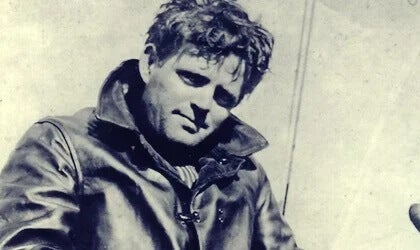Today we present a brief biography of Jack London, who represented that literary essence in which nature became physical and inspiring, never before has the genre of adventures marked so many generations with a unique and incomparable style, this journalist, activist and adventurer wrote in the Same Way lived: always to the limit, with perseverance, united to nature and challenge.
A lot of people may not know why Jack London started writing: for money, to get out of poverty, so, with almost no training, he put all his efforts into two basic tasks when he was still a teenager: reading and writing. However, it was clear that to succeed in literature it would have to offer something new, something that had not been seen until now.
- He got an old typewriter where only capital letters worked and started traveling.
- I wanted to follow the winds that liked adventure.
- Whispering stories unknown to most people.
- He walked east.
- Went to Alaska.
- Met smugglers and was even arrested.
Jack London not only introduced us to the most classic adventure novels, this writer also spoke of important social issues, such as sexual exploitation, alcoholism and mental illness, they said that there was always an avid wolf of adventures and stories to tell.
Unfortunately, this too hasty, passionate and dangerous lifestyle took him out of this world early: he died at the age of 40.
“The function of the human being is to live, not to exist. I won’t spend my days trying to lengthen them, will I enjoy my time?. – J. London-
Jack London was born on January 12, 1876, in San Francisco, California, to Flora Wellman, a young woman with great musical skills who fell in love with an astrologer, William Chaney. It must be said here that London’s father was one of the most serious and respectable figures in this field, however, it was also this man who never recognized his fatherhood.
Flora ended up marrying John London, an American Civil War veteran, whose son took his last name, the financial resources they had were so scarce that they could barely educate little Jack, yet from a very young age the boy knew very well what he wanted: he wanted to be a writer.
London spent its entire childhood and adolescence with this goal in mind, has worked in the railway industry, cleaning oysters, loading coal and canning machines, reconciling all these tasks with his constant visits to libraries, feeding on all the novels and travel books that fall into his hands.
In 1892, Jack London joined the California Fisheries Patrol department of the California Natural Resources Agency, allowing him to travel to Japan on a schooner, so he could discover these lands and feel the effects of a typhoon on his skin. His first experience made him want more. His thirst for adventure would never be satisfied.
Barely a year later he joined Kelly’s army, fighting for the social rights of the country’s unemployed, was arrested for it, but these months he used them to write his first novel: A Sabedoria do Caminho, this small work allowed him to win a literary contest and made him think it would be good to enroll in the University of California to have a more academic background.
However, the financial problems and the? Call? From nature prompted him to flee again, embarking on new adventures, he would travel to Canada, specifically the Klondike, where the gold rush began, this experience did not bring him any material benefit, as he found no gold. it was the best experience he had, inspiring most of his books.
Jack London returned home in 1898, from that moment on he had only one goal in mind: to publish his stories, and he did so with To the Man On Trail, then sold The Overland Monthly, but both works earned him just over $10 for every thousand dead, he managed to get $40.
However, he entered the literary world when magazines began publishing his travel, experience and adventure stories; in 1900 he earned about $2,500 and, as a result, managed to support his parents and enjoy a good life, his name began to be known worldwide at the age of 27, thanks to The Call of the Jungle (1903). In this play, he tells the story of a dog that found his place in the world pulling a sled on the Yukon.
Later, O Lobo do Mar, Caninos Brancos (1906) and John Barleycorn (1913), a reflection book detailing his battle with alcohol. He highlights his work as a social journalist, covering, for example, events such as the Russian-Japanese War, the life of the Hawaiian people, social exploitation around the world and the struggle of workers for social rights.
Jack London was married twice and had two daughters, left a legacy of 50 books and 200 stories, lectured on capitalism, nature, animals, unfortunately he was unable to expand his work because his health did not allow him, as he died at the age of 40 due to alcoholism and kidney disease.
Many historians studying Jack London’s biography believe he may have committed suicide, as do most of his literary characters. His remains are at Jack London Historical Park in California.

